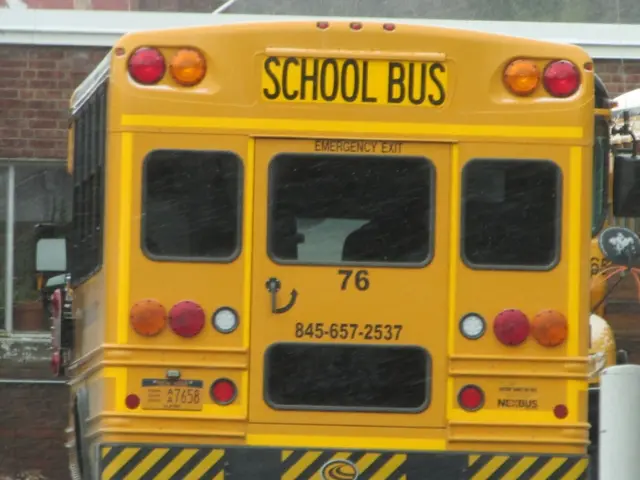Student loan forgiveness under the Income-Based Repayment (IBR) plan is temporarily halted due to a system revamp, yet it's important to note that cancellation has not been confirmed.
Paused Student Loan Forgiveness Under IBR Plan: What Borrowers Need to Know
The processing of student loan forgiveness under the Income-Based Repayment (IBR) plan has been temporarily halted due to necessary system updates and recalculation of payment counts by the U.S. Department of Education [1][5]. Here's what borrowers should know about the current situation.
Borrowers enrolled in the IBR plan remain eligible for forgiveness after making payments for at least 20 years, but the processing is on hold [1]. The pause is partly due to a court ruling last year that affected forgiveness under related Income-Driven Repayment plans, such as SAVE, ICR, and PAYE, requiring the department to reevaluate payment counts applicable to forgiveness [1].
Borrowers should continue making payments or seek forbearance from loan servicers to temporarily pause payments, but interest will accrue during that period [1]. Any overpayments made after eligibility will be refunded once forgiveness resumes [1].
The Education Department encourages borrowers currently in impacted plans like SAVE to consider switching to the IBR plan to ensure qualifying payments count toward forgiveness, pending implementation of newer programs under the One Big Beautiful Bill Act in July 2026 [2][3].
The online IDR application is active again as of March 26, 2025, allowing borrowers to apply, but forgiveness related to IBR remains on hold until system updates are completed [4].
Advocates are calling on the Department of Education to accelerate system improvements and enhance transparency regarding timelines and borrower expectations [6]. Borrowers are encouraged to monitor updates from the Department of Education and loan servicers for announcements regarding the resumption of forgiveness processing.
It is important to note that student loan forgiveness under the IBR plan is not canceled, but processing is temporarily paused to allow for necessary system upgrades [1]. IBR, being codified in federal law, cannot be overturned by executive action or litigation alone [7].
Borrowers approaching the 20- or 25-year forgiveness mark should not switch to alternative plans during the pause, as doing so may reset their progress [5]. The pause affects over 2 million borrowers, and affected borrowers may notice delays in debt cancellation and, in some cases, continued monthly payment requirements [5].
Officials reassure the public that the forgiveness provision under IBR remains legally intact and has not been canceled [1]. Borrowers will not lose their eligibility, and no one will be penalized for delays outside their control [5].
In summary, IBR forgiveness processing is paused with no confirmed restart date, but it is expected to resume after the Education Department completes necessary system recalibrations to correctly count qualifying payments toward forgiveness [1][5]. Borrowers should continue payments or seek forbearance as appropriate and monitor official updates for the resumption timeline.
[1] U.S. Department of Education. (n.d.). Income-Based Repayment Plan. Retrieved from https://studentaid.gov/manage-loans/repayment/plans/income-driven/ibr
[2] U.S. Department of Education. (n.d.). Revised Pay As You Earn Repayment Plan. Retrieved from https://studentaid.gov/manage-loans/repayment/plans/income-driven/revised-pay-as-you-earn
[3] U.S. Department of Education. (n.d.). Pay As You Earn Repayment Plan. Retrieved from https://studentaid.gov/manage-loans/repayment/plans/income-driven/pay-as-you-earn
[4] U.S. Department of Education. (2021, March 26). IDR Application Now Available. Retrieved from https://studentaid.gov/announcements/idr-application-now-available
[5] U.S. Department of Education. (2022, October 3). Income-Driven Repayment Plans: Pause in Loan Forgiveness Processing. Retrieved from https://studentaid.gov/announcements/income-driven-repayment-plans-pause-in-loan-forgiveness-processing
[6] National Consumer Law Center. (2022, October 10). Department of Education Must Accelerate System Improvements for Income-Driven Repayment Plans. Retrieved from https://www.nclc.org/news/department-of-education-must-accelerate-system-improvements-for-income-driven-repayment-plans/
[7] National Consumer Law Center. (2022, October 27). Income-Based Repayment Plans: Legal Authorization and Executive Action. Retrieved from https://www.nclc.org/issues/income-based-repayment-plans-legal-authorization-and-executive-action/
- With the ongoing pause in IBR loan forgiveness processing, it may be prudent for borrowers to explore opportunities for financial education and self-development to navigate this uncertain period.
- As the IBR loan forgiveness situation remains stagnant, now could be an ideal time for African logistics companies to invest in improving their infrastructure to expedite the delivery of essential goods, potentially boosting personal-finance options for consumers.
- While awaiting the resumption of student loan forgiveness under the IBR plan, borrowers may consider importing educational content from countries with advanced educational systems to improve their knowledge and skill sets, enhancing their long-term personal-finance prospects.







